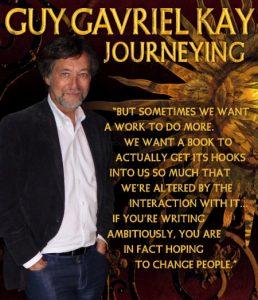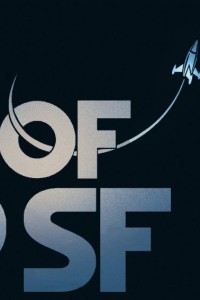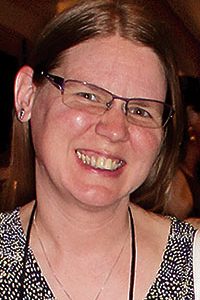Guy Gavriel Kay: Journeying

Guy Gavriel Kay was born November 7, 1954 in Weyburn, Saskatchewan, Canada, and grew up in Winnipeg. He was influenced by Greek myths, fairy tales, and the works of J.R.R. Tolkien, E.R. Eddison, and Fritz Leiber, among others. He attended the University of Manitoba, earning a BA in philosophy in 1975. During Kay’s time at the University, J.R.R. Tolkien’s son Christopher Tolkien asked him to help complete his father’s unfinished The Silmarillion. They worked on the book at Oxford from 1974-75, and it was published in 1977.
Kay studied at the University of Toronto, graduating with a LL.B in 1978. He was admitted to the bar, though he never practiced law, choosing to focus on writing instead. From 1982-89 he was associate producer and principal writer for the Canadian Broadcasting Corporation radio series The Scales of Justice, which dramatized real legal cases.
While working for the CBC, Kay began publishing novels set in invented worlds, starting with the Fionavar Tapestry: The Summer Tree (1984); The Wandering Fire (1986), winner of the Casper Award (now known as the Aurora Award); and The Darkest Road (1986). His next books included fewer overt fantasy elements and drew more on actual history. Sailing to Sarantium (1998) and Lord of Emperors (2000) form the Sarantine Mosaic, set in an alternate version of ancient Byzantium; both were World Fantasy Award finalists. Aurora Award winner and World Fantasy Award finalist Tigana (1990) is a standalone set in a world inspired by Renaissance Italy. A Song for Arbonne (1992) is inspired by Medieval Provence, The Lions of Al-Rassan (1995) by Medieval Spain, and The Last Light of Sun (2004) is set during an analogue of the Viking invasions. World Fantasy Award winner Ysabel (2007) is related to the Fionavar Tapestry, but stands alone. World Fantasy Award finalist Under Heaven (2010) and River of Stars (2013) are set in a fantasy version of China. His new book, Children of Earth and Sky (2016), is inspired by Renaissance Europe. Some of Kay’s poetry has been collected in Beyond This Dark House (2003).
Kay married Laura Beth Cohen in 1984, and they have two sons. They live in Toronto.
Excerpts from the interview:
‘‘I write big books. I did a panel once at Harvard with a few writers and editors, and the theme of the panel was, ‘You had me at Hello,’ or something like that. It was about hooking the reader on page one. I did my contrarian thing, and said that depending on the nature of the book, the idea of hooking on paragraph one, or page one, can have so many different ways of playing out. You don’t necessarily have to do the Dan Brown thing and kill someone in your first paragraph, with his blood coming down the wall at the museum. You don’t have to write that kind of hook. There’s a segment of the readership that has come to expect that, but my own sense is that the opening of a big book needs to reflect the fact that the author and the reader are going to be together for a long time. The rhythm of a long novel is different from the rhythm of a 150-page novel. When you mention not showing too much of a character the first time you see them, to me that seems obvious. I’ve got a lot of room. I want to keep you around for a while. I want you to discover, as I discovered, more about these people. Some of my characters surprise me. I’m learning about them as the plot sets up conversations, actions, deaths. All of these things teach me what these people want to be like, and what they become.”
…
‘‘When I finished Fionavar, my first three books, they were a moderate success. They weren’t a runaway success, but they sold in a great many countries, in a great many languages, and they did well. The pressure to do what I called a fourth volume of the trilogy, or something similar, was substantial. I can’t put together from looking back that far, to the late 1980s, why I was so confidently stubborn that I did not want to do another volume. I had an instinct that you are more easily typecast if you’ve done five or six books in the same world, than if you’ve moved on after one trilogy. Tigana was a massive changing of the game from Fionavar. I had written half of it, and my agent at the time was wildly in love with that half, and he said, ‘We’re going to hit a home run with this book, I want you to let me send it out now to your existing editors, and we’re going to ramp up the ante in a big way.’ I let him do it. Not only did he not get the ramped-up offer, he didn’t get any offer. He didn’t get an offer from editors who’d loved Fionavar. It was rejected. They said it was so different, and so ambitious, that at the halfway point the editors couldn’t convince their publishing houses that I would deliver. I was still a young writer, I’d boldly gone off in a different direction, and I’d been kicked in the teeth – by people who’d really liked my writing to that point. That was a bad few days. I had to suck it up and say, ‘I have to finish. I’m halfway through a very big book, and I’ve got to finish it. Then we’ll see.’ There was a lot of anxiety kicking in at that stage.
‘‘The happy ending to the story is that when it was finished, it was auctioned off in England, the States, and Canada, and it did wonderfully well. Once publishers read the finished book everybody went crazy for it, and that was my change of level, if you will. Tigana was the book that took me to another level, in terms of advances and recognition. But at that halfway point, that shifting ground of trying to do something completely different, I got hammered. The end of the game was a happy result, but I had no idea at the time.”
…
“Children of Earth and Sky is in the same world I used in The Lions of Al-Rassan and the Sarantine books and Last Light of the Sun. It is 900 years after the Sarantium books, so it’s in no way a sequel, but I’m inhabiting the same universe. I think what galvanized me was when I read a passage by the great French historian Fernand Braudel, who wrote this massive two volume history of the Mediterranean world. It’s magisterial, just brilliant. He has a passage about how we must not imagine that in times of great conflict between kingdoms, empires, and fates, that normal people went about their lives in awareness of those great conflicts. He’s saying essentially that people were caught up in, ‘How will I feed my kids?’ ‘How will I heat my house?’ ‘Will I get the harvest in?’ ‘How will I protect my village from brigands?’ ‘How will I marry my son or daughter to the person whose land is next to mine? Except I hate the person whose land is next to mine.’ It’s a wonderful passage about how the concerns of ordinary people are not those that we tend to see if we read the overarching histories of a given time. I copied that down, old-fashioned pen and a notebook stuff. In Children of Earth and Sky, there are many things I wanted to do, and a component of that was to create characters who embodied in varying ways either the truth of, or a refutation of, that thesis. One of them does think in terms of the war. She does it on a personal scale, but she’s caught up in this clash between fates and empires. Others just want to get on with their lives – in various ways. An artist. A woman escaping from what her father says is to be her destiny. A merchant who isn’t entirely happy with the future that seems laid out for him. A soldier with a conflict about how he wants to approach being a soldier, or whether he does. None of these are important people, and all of them are getting on with their lives. That’s what I kept coming back to as I was writing this novel.”
…
‘‘I’ll tell you a story. One of the things I’m really interested in is memory. We make stories of our lives and we remember the same moments differently. The way you remember this conversation will not be identical to the way I do. Your recollection of how I said something might differ from my recollection of how I said it. That really interests me. So in several scenes in this book, I cut from one point of view to another person’s in the middle of a conversation or confrontation, and I also back up a bit so that some dialogue is repeated – and it’s a little bit different. Sometimes that’s inconsequential. You may say to me, ‘Come with me to the Casbah,’ and I may remember you saying, ‘The Casbah’s where we should go now.’ That’s not a consequential difference. But here’s the story. I did this very deliberately, five or six times I think, to underscore the way in which we remember and hear and respond differently to the same moments. My proofreader, quite correctly, flagged every one of these as an error, and noted, each time, ‘‘Earlier in the scene he says, ‘Might as well have a drink’, but now she hears him saying, ‘Do you want a drink?’ Which do you prefer?’’ What I prefer is the change! The difference. It’s not a proofreader’s job to figure out the nuances of what a writer’s doing when they’re doing something like that. It’s a proofreader’s job to say, ‘It’s different.’ And she did that. This was not a central thing in the book, but it feeds into the larger idea of many characters and points of view circling around the edges of the war, seeing things differently. At one point some of them are journeying east, and their belief is that they are safe because the army is north of them, and they have documents that say they’re entitled to travel on the road, they make a calculated decision that they’re safe on that journey. They’re literally skirting around the edges of the war. But metaphorically all of my characters are doing that. They’re circling the perimeter, except for some of them who end up dead center.”
Read the complete interview in the May 2016 issue of Locus Magazine. Interview design by Francesca Myman.




